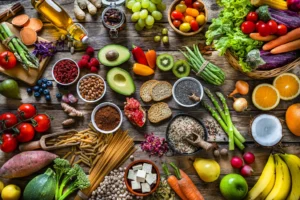Introduction:
Food is a fundamental aspect of our lives, essential for survival, growth, and overall well-being. Beyond merely satisfying hunger, the choices we make in what we consume play a pivotal role in shaping our health. Nutrition, on the other hand, is the science that explores the relationship between the food we eat and its impact on our body. Let’s embark on a journey to unravel the intricate web of food and nutrition, understanding how they contribute to a healthier, more vibrant life.
The Basics of Food:
At its core, food is any substance consumed to provide nutritional support for the body. It encompasses a vast array of items, ranging from fruits and vegetables to grains, proteins, and fats. Each component of our diet serves a unique purpose, supplying the body with essential nutrients like carbohydrates, proteins, fats, vitamins, and minerals.
- Carbohydrates: Often referred to as the body’s primary source of energy, carbohydrates are found in foods like grains, fruits, and vegetables. They fuel our daily activities and are crucial for brain function.
- Proteins: Vital for growth, repair, and maintenance of tissues, proteins are present in meat, dairy, legumes, and nuts. They are composed of amino acids, the building blocks of life.
- Fats: While often associated with negative connotations, fats are essential for the absorption of certain vitamins, hormone production, and insulation. Healthy fats can be found in avocados, nuts, and olive oil.
- Vitamins and Minerals: These micronutrients play key roles in various bodily functions. For example, vitamin C supports the immune system, while calcium is crucial for bone health. A diverse diet ensures an adequate intake of these essential elements.
The Science of Nutrition:
Nutrition delves into the complex interplay between food and the human body. It considers factors such as metabolism, digestion, and nutrient absorption. Understanding nutrition involves recognizing how different foods contribute to overall health and the prevention of diseases.
- Macronutrients and Micronutrients: Nutrition categorizes nutrients into macronutrients, needed in larger quantities (carbohydrates, proteins, fats), and micronutrients, required in smaller amounts (vitamins, minerals). Achieving a balance is essential for optimal health.
- Caloric Intake and Energy Balance: The number of calories we consume versus the calories we expend influences weight management. Striking a balance ensures that our bodies receive the energy required for daily activities without excess that leads to weight gain.
- Dietary Guidelines: Health organizations provide dietary recommendations to guide individuals toward a balanced and nutritious diet. These guidelines often emphasize the importance of variety, moderation, and portion control.
Impact on Health and Well-being:
The choices we make regarding food and nutrition have far-reaching consequences for our health. A well-balanced diet supports physical well-being, helps prevent chronic diseases, and enhances mental health. Conversely, poor dietary habits can contribute to conditions like obesity, diabetes, cardiovascular diseases, and nutritional deficiencies.
- Weight Management: Maintaining a healthy weight is closely tied to proper nutrition. Balanced diets, coupled with regular physical activity, contribute to weight control and overall well-being.
- Disease Prevention: A nutrient-rich diet is a powerful ally in preventing diseases. For instance, diets high in fruits and vegetables are associated with a reduced risk of certain cancers, while a diet low in saturated fats supports heart health.
- Mental Health: Emerging research highlights the link between nutrition and mental well-being. Nutrients like omega-3 fatty acids, found in fish and nuts, are associated with improved mood and cognitive function.
Conclusion:
In essence, food and nutrition are inseparable components of a healthy lifestyle. The choices we make in what we eat influence not only our physical health but also our mental well-being. By understanding the science behind nutrition and adopting balanced dietary habits, we empower ourselves to lead fuller, more vibrant lives. Let’s embrace the power of food as a source of nourishment and vitality, recognizing its profound impact on our journey toward well-being.





